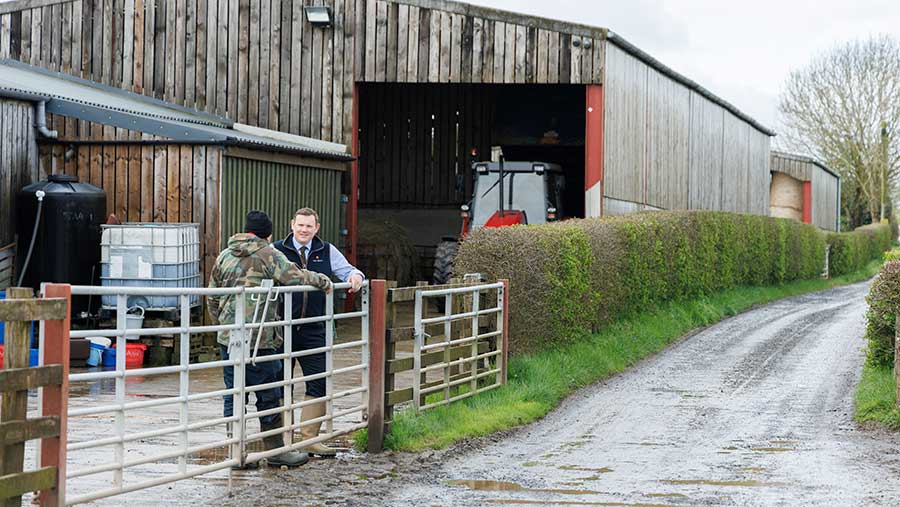Advertiser content
Navigating volatility: Strategies for farm businesses
 © GSC Grays
© GSC Grays About the author

By Greg Ricketts, head of farm business, GSC Grays
In recent times, volatility has become an inevitable and ongoing challenge for farm businesses, impacting both input costs and output prices.
Whether in the form of fluctuating commodity prices or unpredictable expenses, a strategic approach is required to create a sustainable business and ensure long-term success.
From cereals to livestock, and from feed to fuel, no aspect of farming remains untouched. Acknowledging and addressing these issues is the cornerstone for developing resilient strategies tailored to the unique needs of each farming enterprise.
Lowering the cost of production
One crucial tactic for mitigating risk involves keeping costs low to achieve the greatest profit margin.
For most farmers, the first and fundamental step is understanding their cost of production (COP).
Only once this is achieved can they begin looking for efficiencies. A recurring theme in our Farm Business Advice Service (FBAS) review has been that lower input systems less reliant on purchased inputs have been lower-yielding but far more resilient to external factors and, therefore, more profitable in tougher markets.
By striving for the lowest COP, farms can not only cope with challenging times but are also better positioned to capitalise on favourable market conditions, maximising profitability when opportunities arise.
Financial planning for a stronger business
Central to this approach is the production of a farm budget. A budget is not just a forecast produced at the start of the financial year; it should be a live document that is regularly reviewed and adapted depending on market conditions.
A budget informs and supports long-term planning and strategic decision-making. It is also fundamental when assessing borrowing requirements and approaching banks for lending or assisting with business restructuring.
Managing cash flow
Many farmers are bound by overdrafts and finance limits. Those who can manage their cash flow proactively can buy when market conditions are favourable, rather than out of necessity.
Purchasing inputs forward at advantageous prices, coupled with strategic selling during market upswings, enables farmers to sell when conditions are right, not when they are forced to.
Successful and effective farm businesses ensure sufficient headroom in their forecasts. Ideally, in more profitable times, building cash reserves can provide a buffer for more difficult times.
In practice, to achieve this, some of our clients run a separate bank account to build a “rainy day” fund for more difficult times or opportunistic purchases.
Monitoring markets
Achieving stability extends beyond COP and cash flow. It requires a comprehensive understanding of market dynamics and a forward-looking mindset.
By staying on top of market trends and proactively planning for future contingencies, farmers can position themselves for success amidst uncertainty.
It is all interlinked. Once you understand your COP, you know what your profit margin will be.
Selling can often be a gamble, and while it is tempting to hold out for the top of the market, a better strategy is to sell when you can see sufficient profit and the recovery of costs.
A popular strategy for selling cereals is the rule of thirds: selling one-third of the predicted yield at planting, one-third in spring, and one-third at the spot price to mitigate any potential yield shortfall.
Managing volatility in farm businesses demands a holistic approach that transcends mere financial strategies.
It requires a clear understanding of market forces, coupled with proactive planning and a commitment to financial resilience.
By embracing these principles, farm businesses can not only withstand volatility but thrive.
Seeking professional advice and support
As farm businesses confront the uncertainties of tomorrow, they must recognise volatility not as an insurmountable obstacle but as a catalyst for innovation and resilience.
By adopting strategic approaches, market engagement, and financial management, farmers can create a sustainable business, achieving long-term prosperity in an ever-changing agricultural landscape.
The free FBAS provided by GSC Grays – which is funded by Defra – provides a second opinion to help farmers take a critical look at their business from a different perspective.
Farmers are deeply connected to their businesses, which can make it difficult to step back and consider new approaches.
It’s easy to feel disheartened by the weather, volatile markets and crop prices, but there is specialist advice available to help navigate these challenges.
Through our FBAS scheme, many farms have had positive discussions, and finding a trusted partner to get started helps.
I strongly recommend that farm businesses take advantage of this free advice before the scheme ends in March 2025.
Provided by
GSC Grays are rural land and property experts providing specialist industry support and extensive cross-sector advisory services to farming businesses across the North of England and Scottish Borders.
With a reputation for delivering expert advice that creates opportunities, adds value, and achieves real results for clients, we understand that every business is different with its own specific needs.
By taking the time to understand you and your requirements, we provide a fully bespoke service designed to drive productivity and profitability.
Our innovative approach challenges traditional thinking to deliver practical and progressive advice through trusted local consultants across six key service areas:
For more information about GSC Grays, please visit https://www.gscgrays.co.uk
